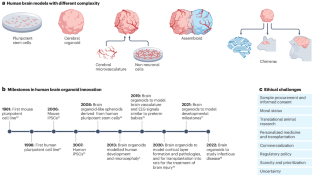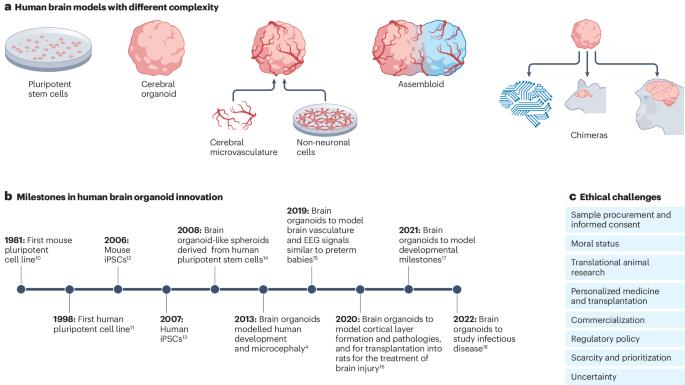The ethical landscape of human brain organoids and a mindful innovation framework
IF 37.6
引用次数: 0
Abstract
Human brain organoids can partly mimic the structure and function of human brains in vitro, thereby providing a platform for investigating health and disease in the human brain. However, human brain organoids require complex ethical considerations that pose challenges for standard ethical approaches owing to their increasing complexity, human mimicry and implementation in chimera models. In this Perspective, we outline the ethical landscape of human brain organoids, including sample procurement and informed consent, translational animal research, personalized medicine and transplantation, commercialization, moral status, regulatory policy, scarcity and prioritization, uncertainty, and responsible innovation. We then propose to view brain organoid research through a new lens of ‘mindful innovation’, that is, societally responsible and responsive innovation with respect to the scientific landscape and social, political and economic conditions. We introduce five core principles of this framework: exploration, contemplation, involvement, adaptation and demarcation, and we illustrate how a framework of mindful innovation may handle ethical challenges and chart an ethical pathway for brain organoid research. Human brain organoids can partly mimic features of the human brain. This Perspective discusses key ethical considerations in human brain organoid research and introduces an ethical framework of mindful innovation to conceptualize and guide ethical considerations of human brain organoid research.


人脑器官组织的伦理前景与心灵创新框架
人脑器官组织可以在体外部分模拟人脑的结构和功能,从而为研究人脑的健康和疾病提供了一个平台。然而,人脑器官组织需要考虑复杂的伦理问题,由于其复杂性、人体模仿性和嵌合体模型的实施,对标准伦理方法构成了挑战。在本《视角》中,我们将概述人脑类器官的伦理状况,包括样本采集和知情同意、转化动物研究、个性化医学和移植、商业化、道德地位、监管政策、稀缺性和优先顺序、不确定性和负责任的创新。然后,我们建议从 "有良知的创新 "这一新视角来看待类脑器官研究,即对社会负责、顺应科学环境和社会、政治及经济条件的创新。我们介绍了这一框架的五项核心原则:探索、沉思、参与、适应和划界,并说明了用心创新框架可如何应对伦理挑战,并为类脑研究规划出一条伦理之路。
本文章由计算机程序翻译,如有差异,请以英文原文为准。
求助全文
约1分钟内获得全文
求助全文

 求助内容:
求助内容: 应助结果提醒方式:
应助结果提醒方式:


